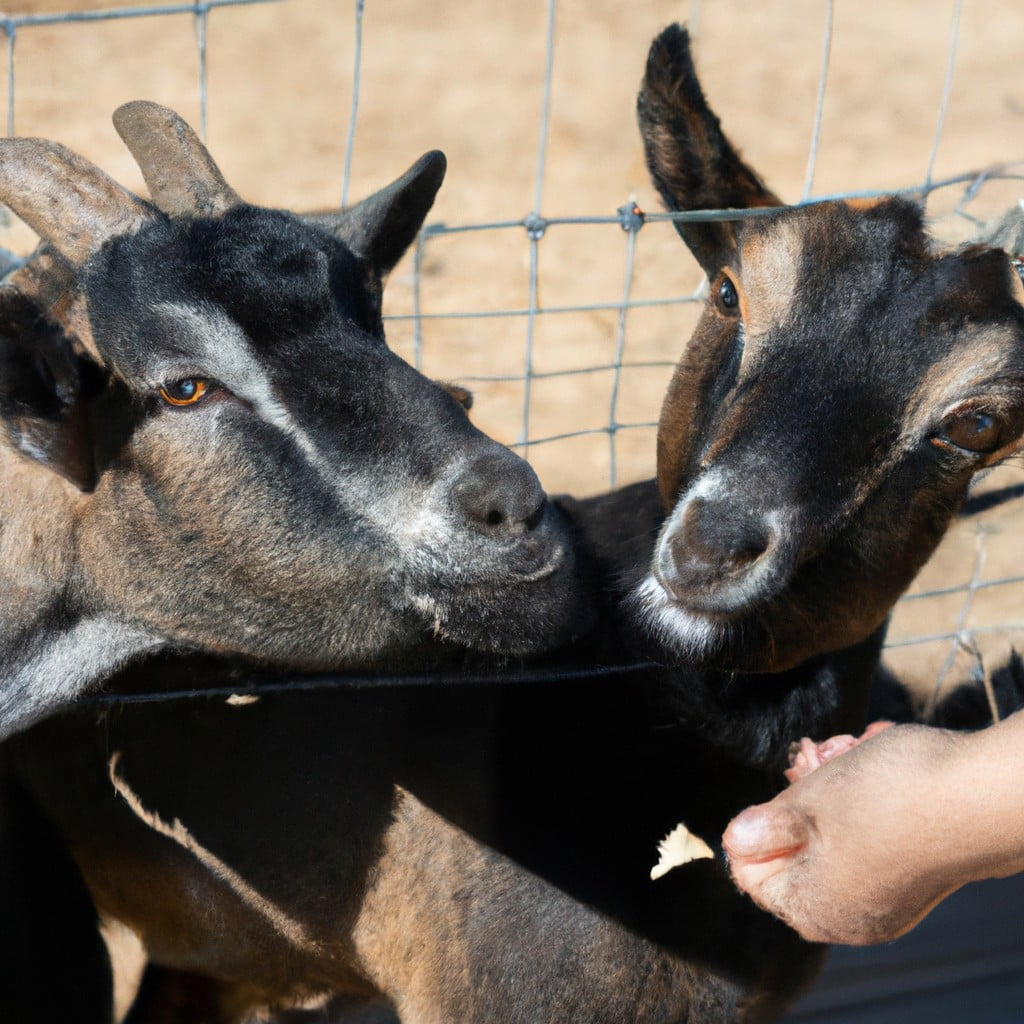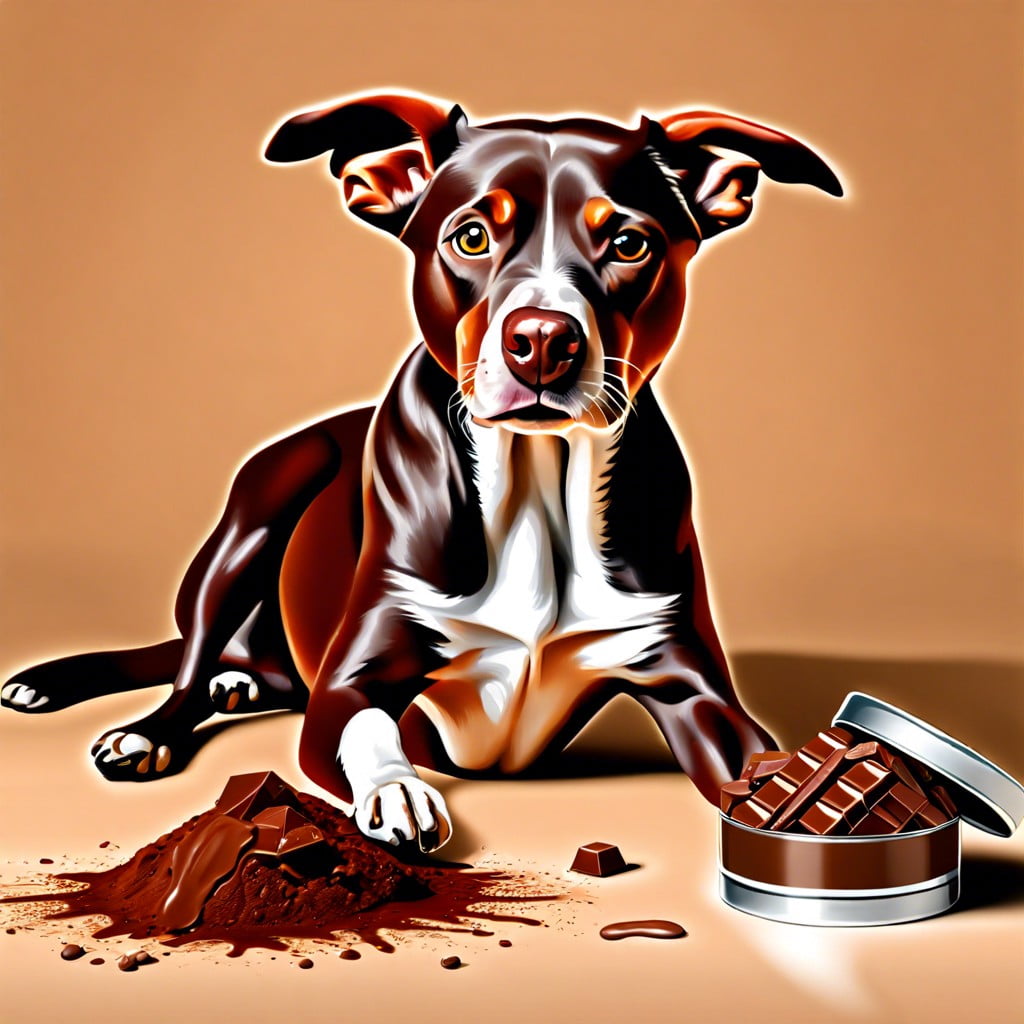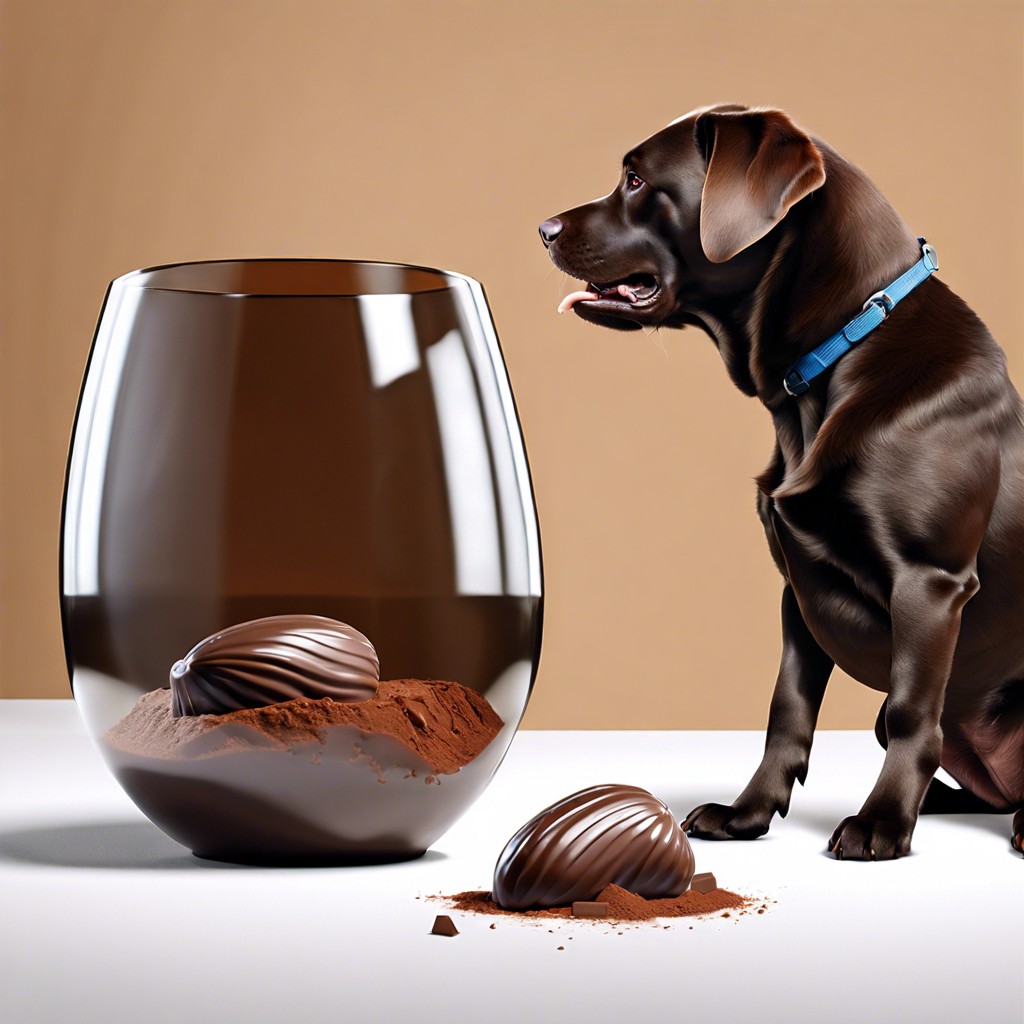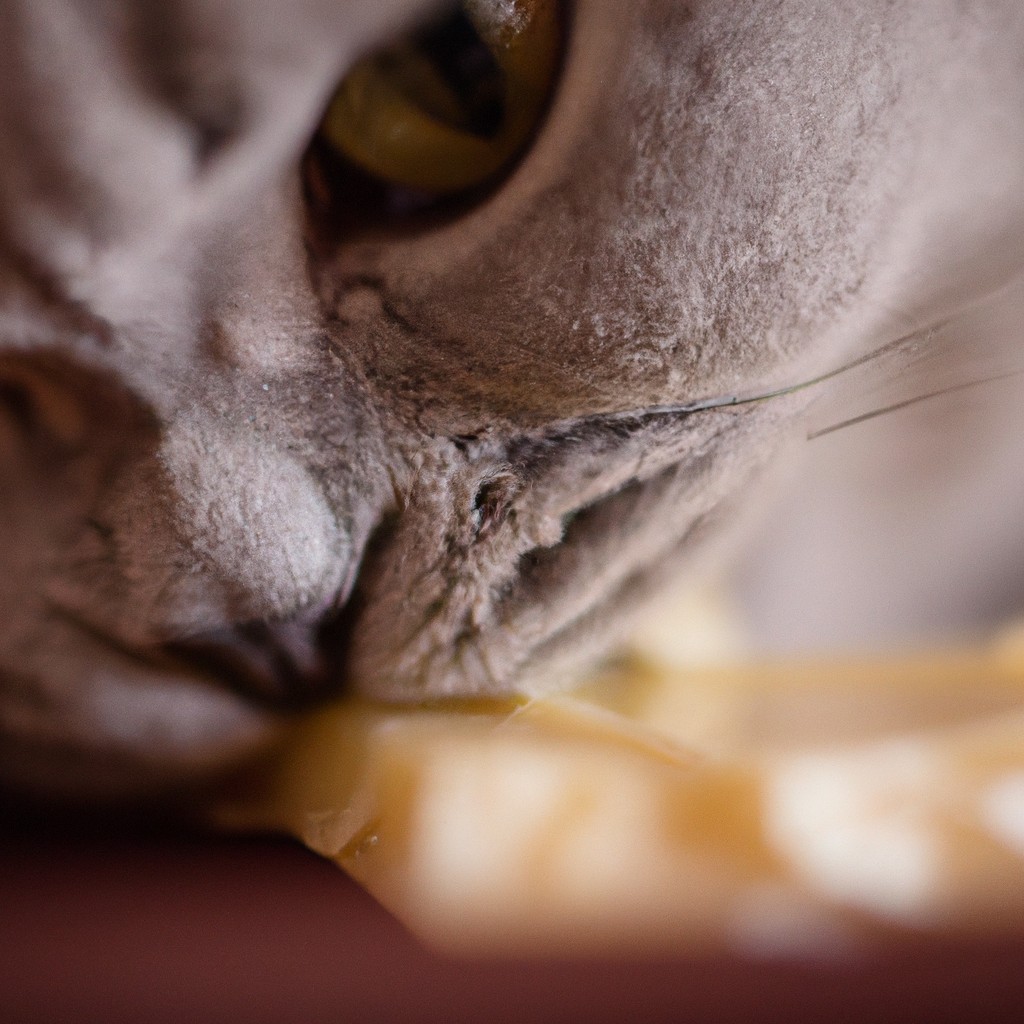No, goats should not eat chocolate as it contains theobromine, which can be toxic to them.
Goats, like many animals, should not be given chocolate. Chocolate contains theobromine, a compound that is toxic to livestock, including goats.
While small amounts may not cause immediate harm, larger quantities can lead to serious health issues such as heart problems, seizures, and in severe cases, even death.
Therefore, it’s crucial to keep your goats’ diet chocolate-free. This article will further delve into the reasons behind chocolate’s toxicity to goats and offer safe, nutritious alternatives to include in your goat’s diet.
Key takeaways:
- Goats should not eat chocolate due to its theobromine content.
- Chocolate can be toxic to goats and lead to serious health issues.
- Even small amounts of chocolate can cause symptoms such as rapid heart rate and seizures in goats.
- It’s important to monitor goats closely if they consume chocolate and seek veterinary assistance if any symptoms develop.
- Safe and nutritious alternatives to chocolate include fruits, vegetables, and grains.
Inside
Is Chocolate Safe for Goats?

Contrary to popular belief, chocolate is not safe for goats. Similar to other domestic animals like dogs and cats, these ruminants react badly to an alkaloid in chocolate called theobromine. Theobromine is easily broken down and excreted by humans, but goats have a longer breakdown period, leading to potential toxic accumulation over time.
Next, chocolate, especially dark and baking chocolate, contains a considerable amount of caffeine, another substance harmful to goats. Caffeine, like theobromine, can give rise to toxicity symptoms in goats.
Lastly, the high sugar content in chocolate can upset the ruminal microbial balance in goats, causing digestive issues. Furthermore, the excessive fat in chocolate increases the risk of obesity and associated health problems.
If a goat does consume chocolate, it is necessary to monitor them closely and take immediate action if any signs of theobromine or caffeine poisoning develop, like restlessness, rapid breathing, or seizures. If in doubt, a vet should be called at once.
It’s worth mentioning that goats should have a diet abundant in hay, grains, greens, fresh water, and minerals rather than treats like chocolate. Offering healthy and safe alternatives to chocolate would be beneficial in keeping your goats healthy and free from potential toxic substances found in such treats.
Is Chocolate Poisonous to Goats?
Despite its appeal to humans, chocolate is indeed toxic to goats. The reason lies primarily in its theobromine content, a compound goats cannot effectively metabolize.
Even in small quantities, theobromine can lead to noticeable adverse effects such as rapid heart rate, restlessness, and digestive problems in goats. High consumption could result in severe symptoms and potentially fatal outcomes, including seizures or heart failure.
The level of toxicity also depends on the type of chocolate ingested. Darker chocolate varieties generally pose a higher risk compared to milk or white chocolate due to the greater theobromine concentration.
The exact amount that triggers negative consequences varies based on factors like the goat’s size and overall health. But as a crucial guideline, preventing chocolate consumption altogether is best; it’s better to be safe than sorry when it comes to your goat’s health.
If a goat does consume chocolate, immediate veterinary assistance is vital. The goat may require treatments such as activated charcoal to absorb the theobromine, or IV fluids to expedite the compound’s exit from the body.
What Happens If a Goat Eats Chocolate?
If a goat consumes chocolate, several adverse reactions can occur due to the presence of a substance called theobromine, which they cannot metabolize effectively.
First off, the goat may experience restlessness or unease, almost as if it was feeling jittery or nervous.
This can escalate to tremors or even seizures in severe cases.
Long term theobromine ingestion can lead to internal damage, such as liver failure, heart issues and even death.
You might also notice gastrointestinal issues cropping up, like diarrhea or vomiting, as the goat’s body tries to expel the foreign substance.
In some cases, your goat may exhibit excessive thirst and urination. This is due to the diuretic effect of theobromine.
It’s crucial to contact a vet immediately if your goat has ingested chocolate and shows these symptoms. While there is no specific antidote for theobromine poisoning, a vet can provide supportive care to manage symptoms and mitigate damage.
Symptoms of Theobromine Poisoning in Goats
When a goat ingests chocolate, they may experience theobromine poisoning, caused by the alkaloid found within cacao plants. To assess your goat’s health critically, the following symptoms are imperative to look out for:
- Increased heart rate: Theobromine can cause a rapid heartbeat in animals who are not equipped to metabolize it. This might present as your goat seeming restless or agitated.
- Muscle tremors: Look for shakiness or spasms in your goat that go beyond their typical movements.
- Frequent urination: If your goat seems to be producing more urine than usual, this could be a sign that their body is trying to eliminate the theobromine.
- Diarrhea: This unpleasant symptom may appear as their body tries to get rid of the toxic substance.
- Difficulty breathing: In severe cases, your goat might have trouble with their respiratory system.
- Seizures: At high enough levels, theobromine can cause seizures. If this occurs, immediate veterinary attention is required.
If any of these symptoms appear, it’s crucial to contact a vet immediately. Let the professional know your goat has consumed chocolate as this information can enhance the clinical decisions made for your animal’s treatment.
How Much Chocolate Is Too Much for Goats?
Even a small amount of chocolate can cause severe problems in goats due to the theobromine. The toxicity level differs based on the type of chocolate. Dark chocolate and baking chocolate have higher theobromine levels, thus more toxic to goats. Milk chocolate or white chocolate has lower levels, but still should be avoided.
If ingested, symptoms such as quickened heartbeat, restlessness, excessive urination can occur. In severe cases, seizures or even death could happen.
Act fast if you suspect your goat has consumed chocolate. Contact a vet immediately for instructions on the next course of action – mostly likely this will involve inducing vomiting to purge the theobromine and any other toxins.
Do note, prevention is the best strategy. Store chocolate or any food containing chocolate away from the area where goats are kept to avoid such situations.
Always double-check goat treats for any traces of chocolate or cocoa powder. Guarantee they have a balanced diet mainly of hay, grains, fruits, and vegetables.
Reasons Why Goats Can’t Eat Chocolate
The primary reason behind goats not being allowed to consume chocolate is a chemical known as theobromine, which is found in all forms of chocolate — dark, milk, and white. A member of the methylxanthine class, theobromine is similar to caffeine, and it is profoundly toxic for goats as they lack the metabolic pathways to break it down effectively and expel it from their bodies.
Additionally, chocolate also contains methylxanthines like caffeine which can cause adverse effects such as restlessness, rapid breathing, and increased heart rate in goats. With large quantities, these symptoms can escalate to tremors, seizures, and even death in some scenarios.
Moreover, the high sugar content in chocolate can disrupt a goat’s digestive system causing diarrhea, bloating, or other digestive upset. Excess sugar can also contribute to obesity and rotting teeth.
Lastly, fat content in chocolates can cause obesity in goats and lead to secondary health problems such as arthritis and hoof problems.
If a goat accidentally consumes chocolate, call a veterinarian immediately. The professional can help determine the severity of the situation and guide on the necessary steps to take.
Instead of offering chocolates as treats, opt for safer alternatives like fruits or vegetables. Always remember, a healthy diet for a goat includes adequate water, pasture or hay, grains, and mineral supplements.
What to Do If Your Goat Eats Chocolate?
If your goat ingests chocolate, immediate action is essential.
1. First, try to identify the amount and type of chocolate consumed. This will provide crucial information to the vet.
2. Immediately contact your vet. Describe the situation as accurately as possible.
3. Follow the vet’s advice closely. They might suggest inducing vomiting or feeding the goat activated charcoal to absorb the toxins.
4. Once the immediate danger has passed, continue monitoring the goat’s health for any lingering symptoms.
5. To prevent future incidents, secure all potentially harmful foods. Ensure that chocolate is out of the goat’s reach.
6. Educate any visitors or handlers about what foods are safe and unsafe for goats.
If uncertain about anything concerning the health of goats, always err on the side of caution and consult your vet.
Can Goats Eat White Chocolate?
White chocolate is a derivative of the cocoa bean, but does not contain theobromine – the ingredient that is toxic to animals. Despite it being devoid of this toxicity, it is still not appropriate for goat consumption.
Feeding white chocolate to goats is not recommended due to its high sugar and fat content. These elements can upset their digestive system and potentially lead to obesity or other health issues. Moreover, processed food products like chocolate are not part of a goat’s natural diet.
- White chocolate lacks theobromine making it less harmful compared to other types of chocolate.
- Despite the absence of theobromine, white chocolate contains high levels of sugar and fat which can be harmful to goats.
- Consuming a diet high in sugar and fat can cause digestive problems for goats and potentially lead to conditions such as obesity.
- Processed food products, including white chocolate, are not natural components of a goat’s diet.
- Refrain from feeding white chocolate to goats as preventative measure for maintaining their overall good health.
Just because white chocolate is not immediately toxic does not mean it is a safe or healthy choice for your goat. Always choose foods and treats that are within their natural dietary needs.
Can Goats Eat Milk Chocolate?
Despite the delectable smoothness of milk chocolate, it remains an unsafe treat for goats. It contains two substances that goats cannot effectively metabolize – theobromine and caffeine. Theobromine especially poses a severe health risk. Consuming even small amounts can lead to symptoms like vomiting, diarrhea, increased heart rate, and in severe cases, death.
Even though milk chocolate contains less theobromine than dark chocolate, it can still prove lethal. This is due to the potential for goats to consume large quantities given their insatiable appetite, thus leading to theobromine poisoning.
It’s important not to confuse a goat’s willingness to eat something with that item’s safety. Just because they may readily consume milk chocolate doesn’t mean it’s harmless.
Always remember to contact a veterinarian immediately if a goat accidentally ingests chocolate. Quick intervention can often reverse potential harm and restore the goat’s health.
Instead of chocolates, there are numerous safe treats that goats can enjoy without risk. These include fruits like apples, bananas and dried prunes, as well as vegetables such as pumpkin, cabbage and carrots.
What Other Foods Are Poisonous to Goats?
In addition to chocolate, a goat’s diet should be void of other harmful substances such as:
- Avocado: Every part is toxic, including leaves, seeds, and fruit.
- Rhubarb and tomato leaves: They contain oxalates which can cause issues including kidney damage and neurological problems.
- Plants in the nightshade family: This encompasses plants like potatoes and eggplants. Their leaves in particular contain solanine that is not good for goats.
- Some fruits seeds and pits: For instance, those of apples, cherries, peaches and plums contain cyanide.
- Ornamental plants: Certain garden and house plants like azalea, oleander, sago palm, and rhododendron can be lethal.
- Certain trees: Goat owners should be wary of black walnut, yew, red maple, and cherry tree leaves, especially the wilted ones.
To keep goats healthy, it’s critical to always provide ample fresh, clean water, plenty of hay, and a balanced goat feed to fulfill their nutritional needs. It’s equally important to make them accustomed to a good deworming program and regular veterinary check-ups. When in doubt about a specific food, it’s always best to consult with a veterinarian.
What Treats Are Safe for Goats?
Fruits and vegetables provide a delightful treat for goats while also supplying essential nutrients. Apples, carrots, and pumpkins are all high on the list of goat-approved produce. Be sure to remove any seeds from apples, as they contain small amounts of cyanide.
Whole grain breads and oats are also enjoyed by goats and can be used in moderation as a special reward.
Fresh branches from trees such as willow, spruce, and poplar offer a safe chew toy for goats that also support their need to browse.
Treats should always make up a small part of your goat’s overall diet to avoid nutritional imbalances. It’s also crucial not to overfeed, as this can lead to obesity in goats.
Remember to introduce any new food item into your goat’s diet gradually to prevent digestive issues. Even safe foods can cause upset stomachs if presented in large amounts suddenly.
Keep in mind that while you may be tempted to treat your goats to leftovers from your kitchen, not all human foods are safe for goats. Always research or consult a professional before introducing new foods.
How to Give Goats a Healthy Diet
A well-rounded, nutritious diet for goats typically includes pasture, hay, and a balanced feed.
Pasture, wherever available, serves as the main food source and goats graze a variety of plants, leaves, and grasses. Having a diverse diet not only satisfies the goats’ natural foraging tendencies but also provides a mix of essential vitamins and minerals.
Hay, preferably legume types, make up the bulk of a goat’s diet during the colder months when grazing is limited. High-quality hay is necessary to support growth, lactation, and overall health of the goat.
Balanced feed is essential when nutritional needs can’t be met through grazing and hay alone, especially for goats in milk or meat production. The feed should be specially formulated for goats, ensuring the right amount of protein, fiber, vitamins, and minerals.
Minerals and salt should be made available at all times. Goats need these for bone strength, digestion, skin, coat health, and overall well-being.
Fresh, clean water is absolutely essential, and the goats should have free access at all times. Dehydrated goats can develop health issues rapidly, including kidney stones and urinary tract infections.
Remember, occasional use of treats like fresh fruits, vegetables, or specially designed goat treats can be used for training or rewarding goats, but should not make up a large part of their diet. Avoid giving goats kitchen scraps or compost, as these can introduce harmful bacteria or toxins to their system.
Steer clear of potentially harmful foods, including chocolate and other foods containing theobromine. Also, certain plants like azaleas, rhododendron, and wild cherry are toxic to goats. Always ensure they have a safe environment and their pasture is free from such plants.
Can a Pregnant Goat Eat Chocolate?
When it comes to the health of a pregnant goat, it’s even more crucial to maintain a proper diet to support both the goat and her developing kid. Including chocolate in this diet is not advisable due to several factors.
Chocolate comprises theobromine, a substance that can have severe adverse effects on the goat’s health. Goats lack the necessary enzymes to metabolize theobromine efficiently, which can lead to toxicity.
Additionally, chocolate’s high sugar and fat content can negatively impact the goat’s digestive system. Too much sugar can cause bloating in goats which can be especially dangerous for pregnant inhabitants.
Caffeine in chocolate can also prove harmful as it may stress the goat, possibly leading to early or problematic labor.
If a pregnant goat inadvertently consumes chocolate, consider it an emergency and consult a vet promptly.
Instead of chocolate, indulge pregnant goats with fresh green foods, healthy grains, and other safe treats like apples, carrots, or pumpkins. It’s imperative to keep their nutritional needs in check while catering to their fondness for variety.
Remember, the health of a pregnant goat directly influences the health of the future kid.
What Are the Risks of Goats Eating Chocolate?
The biggest risk of goats eating chocolate lies in the compound Theobromine which can be toxic to them. While the amount lethal to goats varies depending on their size, consistently feeding them chocolate can lead to theobromine build-up causing symptoms like restlessness, fast breathing, and shaking.
In large amounts, chocolate can cause serious gastrointestinal issues in goats due to its high fat content. It can disrupt the balance of bacteria in the goat’s gut, leading to conditions such as bloating or even deadly condition like enterotoxemia. Moreover, undue sugar intake from chocolate can result in obesity and other related health issues like diabetes.
Caffeine is another component in chocolate that poses risks. Just like humans, goats can also get caffeine jitters. This can cause rapid heartbeat, high blood pressure, and in extreme cases seizures.
Lastly, feeding chocolate may also discourage your goats from eating their regular, nutritionally balanced diet. This can impact their overall growth and health.
If a goat inadvertently consumes chocolate, it’s important to immediately consult a veterinarian.
Chocolate Contains Theobromine
Theobromine is a bitter alkaloid found naturally in cocoa plants. This compound is the primary reason why chocolate is potentially harmful to goats.
- Theobromine raises heart rate and stimulates the nervous system.
- Animals, including goats, metabolize theobromine slowly, allowing the compound to build up to toxic levels in their systems.
- Even eating a small amount can cause theobromine poisoning in goats.
- Symptoms of theobromine poisoning include restlessness, a rapid heart rate, tremors or even seizures.
- It can be serious enough to be fatal in some instances.
- Theobromine levels are higher in dark chocolate, making it especially dangerous.
- There’s no safe theobromine level for goats; it’s best to avoid chocolate entirely in their diet.
In case of accidental ingestion, it’s essential to contact a vet immediately for advice and potential intervention. Stocking up on goat-friendly treat alternatives will help avoid such incidents.
Chocolate Contains Sugar
The sweet taste of chocolate that we so love comes primarily from its sugar content. In goats, overconsumption of sugar has several adverse impacts. Excess sugar can lead to rapid weight gain and obesity, causing the animal to have difficulty moving, problems with reproduction, and potential gut issues. Higher sugar levels can also cause disorders in the goat’s metabolic system, which could potentially lead to illnesses like metabolic acidosis. Besides that, sugar-rich foods like chocolate cause dental problems.
Goats naturally have a diet that’s low in sugar and high in fiber – a diet that keeps their complex digestive system functioning properly. Hence, feeding them a treat as sugary as chocolate disrupts this balance.
To avoid these problems, stick to safe, healthier treat alternatives such as:
- Fresh fruits: Apples, pears, and grapes are good options.
- Vegetables: You can offer carrots, lettuce, or pumpkin.
- Grains: Oats, barley, and wheat are suitable for goats.
- Hay or grass: These are the best and most natural treats for goats.
Remember to introduce any new treats gradually into their diets and stick to small quantities. With goats, moderation is key.
Chocolate Contains Caffeine
Caffeine is a natural stimulant commonly found in coffee, tea, and chocolate. It affects the central nervous system by blocking the neurotransmitter adenosine. In humans, this results in increased alertness and decreased fatigue.
However, goats’ bodies process caffeine differently. Unlike humans, goats cannot metabolize caffeine. This prevents it from being broken down and removed from their system effectively. Over time, this can cause a buildup of caffeine in the goat’s system, leading to potential health problems such as restlessness, increased heart rate, and even seizures.
Moreover, the effect of caffeine is more pronounced in goats due to their smaller size and different metabolism compared to humans. Even minor amounts of chocolate with caffeine can have adverse effects on them.
Lastly, if a goat does consume caffeine, it’s critical to seek veterinary attention immediately. They could administer strategies to deal with caffeine ingestion, ranging from inducing vomiting to providing intravenous fluids.
Chocolate Contains Fat
High fat content in chocolate is another concern for goat’s health. Being rich in saturated fats, it can lead to overweight and obesity issues in goats if consumed regularly. These fatty substances may also cause digestive complications, leading to discomfort and potential health issues.
Just like humans, goats require a diet low in saturated fats for optimal health. The fat content of chocolate can disrupt the balance of a goat’s diet contributing to complications like high cholesterol levels, which eventually may lead to heart diseases.
To prevent obesity and other health issues, it is advisable to regulate the intake of high fat foods, such as chocolate. Offering low-fat, nutritious food items such as fruits, vegetables, grains, and hay is the right approach to maintaining the health and well-being of goats.
Also, if goats accidentally ingest a substantial amount of chocolate, it’s essential to immediately consult a veterinarian due to potential health risks associated with high fat and other harmful substances chocolate contains.
Can Goats Eat Small Amounts of Chocolate?
Even in small quantities, chocolate is not recommended for goats. The substance theobromine, which is present in all types of chocolate, poses a risk. The amount of theobromine varies depending on the type of chocolate, and even small doses can lead to cases of theobromine poisoning.
Consider the following:
- The digestive system of goats is not designed to process theobromine. It may cause gastric upset even in small amounts.
- Use safe, approved treats or foods to reward goats instead of taking the risk with chocolate.
- Always check with your veterinarian when introducing new food items into your goat’s diet.
- Be aware of the symptoms of theobromine poisoning in goats, which may include restlessness, rapid breathing, and in severe cases, seizures.
- Store chocolate and other toxic foods out of the reach of goats to prevent accidental ingestion.
How Much Chocolate Can Goats Eat Without Any Consequences?
While it may seem tempting to share your tasty treat with your barnyard friend, it is crucial to note that chocolate is potentially harmful to goats and should be avoided. The primary concern revolves around a stimulant present in chocolate called theobromine. Even in small quantities, theobromine can still be problematic.
First, understanding the nature of theobromine helps clarify why even seemingly harmless pieces of chocolate aren’t a good idea. Goats, like many other animals, can’t metabolize theobromine as efficiently as humans.
Next, consider that the concentration of theobromine varies in different types of chocolate. Dark chocolate and baking chocolate contain the highest levels, thus posing the greatest risk.
Then, factor in the size and health of the specific goat. A small nibble might not be instantly dangerous to a large, healthy goat, but for smaller ones or those with existing health issues, it could be more problematic.
Finally, it’s important to stress that while goats often show a penchant for trying many foods, it is the owner’s responsibility to ensure their diet is suitable and safe. Instead of chocolate, opt for goat-friendly treats such as fruits and vegetables, which provide nutrition without the risk.
In summary, there is no safe quantity of chocolate for goats; it’s not a risk worth taking.
FAQ
What is toxic to goats?
Goats are susceptible to toxicity from consuming poisonous plants such as azaleas, China berries, sumac, dog fennel, bracken fern, curly dock, eastern baccharis, honeysuckle, nightshade, pokeweed, red root pigweed, black cherry, Virginia creeper, and crotalaria.
What animals can eat chocolate?
Rats and mice are the only known animals that can safely consume moderate amounts of chocolate, similar to humans.
Can goats have chocolate cereal?
No, goats should not consume chocolate cereal due to the potential toxicity of chocolate compounds for them.
What should goats not eat?
Goats should not eat garlic, onion, chocolate, or any source of caffeine.
How does theobromine in chocolate affect a goat’s health?
Theobromine in chocolate is toxic to goats, leading to severe health complications like an increased heart rate, seizures, tremors, and, in severe cases, can be lethal.
Can baby goats have any amount of chocolate safely?
No, baby goats should not consume chocolate as it contains theobromine, a substance toxic to many animals including goats.
What are the symptoms if a goat accidentally consumes chocolate?
Goats consuming chocolate can exhibit symptoms such as restlessness, increased heart rate, tremors, vomiting, and in severe cases, seizures.




